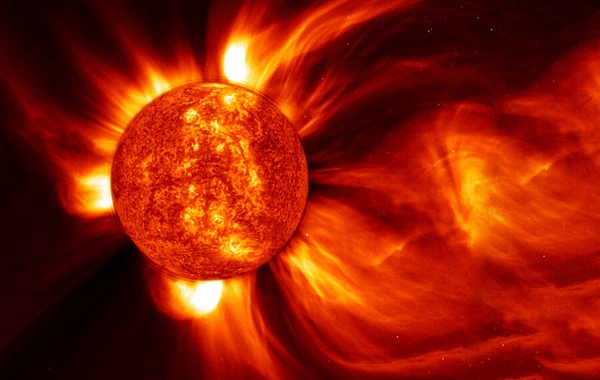Head buzzing and blood pressure fluctuating? It's a magnetic storm — here's what to do

Recently, news headlines often flash with titles like: "Strong magnetic storm expected!", "Be careful - geomagnetic activity is elevated!". And while it may not seem too scary, many people experience not only Earth's magnetosphere "rocking" on such days, but also their well-being. Headaches, fatigue, insomnia, blood pressure fluctuations - sound familiar?
Relax! Magnetic storms are not a death sentence. Let's figure out what they are, who is really sensitive to them, and how to help yourself on such days without turning life into a "Disaster" series.
What is a magnetic storm and why does it affect us?
A magnetic storm is a sharp disturbance of Earth's magnetic field caused by solar activity. When the Sun ejects a powerful stream of charged particles (flares or coronal mass ejections), they "crash" into our planet's magnetic field, causing geomagnetic fluctuations.
For technology - this poses a risk of satellite failures, communication disruptions, and even power grid issues. For humans - it's potential stress on the body, especially for those who are weather-sensitive. Who feels magnetic storms? Approximately 30-50% of people report deteriorating well-being during geomagnetic activity. The risk groups include: people with hypertension or cardiovascular diseases. People with increased anxiety, chronic fatigue. The elderly, pregnant women, and those sensitive to weather changes. But even if you haven't noticed a "reaction to space" in yourself, prevention won't hurt anyone.
How to cope with magnetic storms: 7 simple tips.
Drink more water
During storms, the body loses more fluid, and dehydration intensifies headaches and fatigue. Set yourself a goal - at least 6-8 glasses of clean water per day.
Avoid coffee and alcohol
Even if you adore your morning latte, try replacing it with herbal tea on storm days. Caffeine and alcohol overload blood vessels and the nervous system.
More fresh air and movement
Yes, you want to lie down and not go anywhere. But even 20 minutes of walking in fresh air helps saturate the body with oxygen, normalize blood pressure, and improve mood.
Sleep at least 7-8 hours
During a magnetic storm, the body especially needs recovery. Try to go to bed no later than 11:00 PM, and before sleep - minimum screen time and maximum tranquility.
Watch your diet
Avoid fatty, heavy foods. Focus on vegetables, fruits, greens, fish, nuts. Magnesium (found in buckwheat, bananas, spinach) helps the nervous system cope with stress.
Meditation, breathing practices, yoga
No, this isn't esoteric. These are accessible ways to reduce stress levels. Even 5 minutes of deep breathing will help your body exit "alarm mode".
If necessary - mild remedies
If headaches or blood pressure fluctuations interfere with living, you can use products with magnesium, valerian, motherwort. But it's better to consult with a doctor.
The main thing - don't panic! Magnetic storms are not a universal evil. They're simply a natural phenomenon that you can adapt to. The key is to listen to your body, take care of it, and not fall into anxiety. Sometimes an ordinary cup of chamomile tea and a little quiet - is the best medicine for cosmic anxiety.
So let's stay on course for calmness, care, and mindfulness - and no magnetic storms will frighten us!
Similar News
Doctor named the non-obvious cause of headache
Frequent headaches may be associated with a deficiency of riboflavin (vitamin B2) or magnesium - this mineral regulates vascular tone, and its deficiency can pr...




 Azərbaycanca
Azərbaycanca  По-русски
По-русски  English
English 





